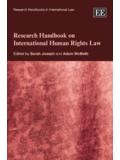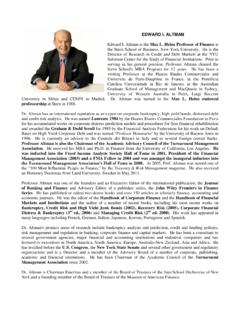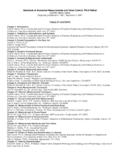Transcription of PUBLICATION OF DIVORCE PROCEEDINGS: …
1 south AFRICAN LAW COMMISSION REPORT PROJECT 114 PUBLICATION OF DIVORCE PROCEEDINGS: section 12 OF THE DIVORCE ACT (ACT 70 OF 1979) August 2002 -ii- -iii- TO DR P M MADUNA, MP, MINISTER FOR JUSTICE AND CONSTITUTIONAL DEVELOPMENT I am honoured to submit to you in terms of section 7(1) of the south African Law Commission Act, 1973 (Act 19 of 1973), for your consideration, the Commission=s report on the PUBLICATION of DIVORCE proceedings. Y MOKGORO CHAIRPERSON: south AFRICAN LAW COMMISSION AUGUST 2002 -iv- -v- INTRODUCTION The south African Law Commission was established by the south African Law Commission Act, 1973 (Act 19 of 1973).
2 The members of the Commission are - The Honourable Madam Justice Y Mokgoro (Chairperson) The Honourable Madam Justice L Mailula (Vice-Chairperson) Adv J J Gauntlett SC Prof C E Hoexter (additional member) The Honourable Mr Justice C T Howie Prof I P Maithufi (full-time member) Ms Z Seedat Dr W L Seriti The Secretary is Mr W Henegan. The Commission's offices are on the 12th floor, Sanlam Centre c/o Pretorius and Schoeman Streets, Pretoria. Correspondence should be addressed to: The Secretary south African Law Commission Private Bag X668 PRETORIA 0001 Telephone: (012)322-6440 Fax: (012)320-0936 E-mail: Website: The project leader responsible for the investigation is Professor C E Hoexter. The researchers are Ms A M Louw and Ms P Matshelo-Busakwe.
3 -vi- SUMMARY OF RECOMMENDATIONS -vii- The south African media are, in terms of sec 12 of the DIVORCE Act 70 of 1979, prohibited from publishing any particulars of a DIVORCE action or any information which comes to light in the course of such an action other than the names of the parties to a DIVORCE action, the fact that a DIVORCE action between the parties is pending in a court of law and the judgment or order of the court. The prohibition does not apply to the PUBLICATION of particulars or information for the purposes of the administration of justice, in a bona fide law report, or for the advancement of or use in a particular profession or science. However, since the provision does not have extra-territorial operation, the foreign media who are allowed to attend proceedings in courts are unrestricted in their reportage of south African DIVORCE proceedings.
4 Since south African citizens have access to the foreign media and the foreign press, the initial purpose of the prohibition is defeated. There are furthermore clear indications that at present the south African media are not complying with sec 12 of the DIVORCE Act. An important reason why the section is not adhered to is that it is seen as being unconstitutional. south Africa has a Constitution with a Bill of Rights which entrenches, inter alia, the right to freedom of speech, freedom of information and the rights to privacy and dignity. These rights are interactive and have to be balanced. Sec 28(2) of the Constitution furthermore specifically protects the rights of children.
5 Sec 12 currently provides no discretion to the court to determine whether or in what respects the case should be held in camera or whether media disclosure should be permitted. It seems undesirable that legitimate areas of non-disclosure (such as aspects involving the interests of minor children) should be endangered by the current non-compliance with the provision, and at the same time that Acts of Parliament should be viewed as unenforceable and accordingly safely to be flouted. The Commission therefore recommends that sec 12 of the DIVORCE Act, 1979 be amended to allow a court the discretion to: -viii- a) make an order to lift the general ban on PUBLICATION and to grant leave to any party to publish such particulars of a DIVORCE or such information or evidence which has come to light in the course of such an action, as the court may deem fit; and b) close the court at any stage of the proceedings where there is a likelihood that harm may result to a child.
6 The amended section will also make it an offence to furnish particulars of a DIVORCE action or any information or evidence which emerges during the course of such an action unlawfully to third parties. The Commission=s proposed amendment of section 12 of the DIVORCE Act, 1979 reads as follows: BILL To amend the DIVORCE Act, 1979 so as to make provision for a judicial discretion to lift the general statutory prohibition on the PUBLICATION of DIVORCE proceedings and to close the proceedings in specific circumstances BE IT ENACTED by the Parliament of the Republic of south Africa, as follows: - Amendment of section 12 of Act 70 of 1979 section 12 of the DIVORCE Act, 1979 is hereby amended by the substitution for section 12 of the following section : "12.
7 Limitation of PUBLICATION of particulars of DIVORCE action (1) [Except for making known or publishing the names of the parties to a DIVORCE action, or that a DIVORCE action between the parties is pending in a court of law, or the judgment or order of the court, no person shall make known in public or publish for the information of the public or any section of the public any particulars of a DIVORCE action or any information which comes to light in the course of such an action.] (a) A person may not publish for the information of the public or any section of -ix- the public any particulars of a DIVORCE action or any information or evidence which emerges in the course of such an action, except with the leave of the court.
8 (b) Notwithstanding the provisions of paragraph (1)(a), any person may, unless the court orders otherwise, publish in relation to a DIVORCE action the following particulars: (i) The names of the parties to a DIVORCE action; (ii) That a DIVORCE action between the parties is pending in a court of law; and (iii) The order of the court. (2) The provisions of subsection (1) shall not apply with reference to the PUBLICATION of particulars or information- (a) for the purposes of the administration of justice; (b) in a bona fide law report which does not form part of any other PUBLICATION than a series of reports of the proceedings in courts of law; or (c) for the advancement of or use in a particular profession or science.
9 (3) If at any stage during the DIVORCE proceedings it appears to the court that there is a likelihood that harm may result to a person under the age of eighteen as a result of the hearing of any evidence, the court may, of its own accord or on application by any interested party, make an order directing that the proceedings be held behind closed doors, and that no person be present unless his or her presence is necessary in connection with the court proceedings, or he or she is the legal representative of any person whose presence is necessary as aforesaid. (4) The provisions of subsections (1),(2) and (3) shall mutatis mutandis apply with reference to proceedings relating to the enforcement or variation of any order made in terms of this Act as well as in relation to any enquiry by a Family Advocate in terms of the Mediation in Certain DIVORCE Matters Act, 1987.
10 (5) Any person who, in contravention of this section , publishes any particulars or information or evidence or unlawfully provides any such particulars or information or evidence to a third party shall be guilty of an offence and liable on conviction to a fine [not exceeding one thousand rand] or to imprisonment for a period not exceeding one year or both such fine and such imprisonment." -x- TABLE OF CONTENTS The page numbers refer to the hard copy and may differ in electronic versions Page INTRODUCTION -v- SUMMARY OF RECOMMENDATIONS -vii- LIST OF SOURCES -xii- TABLE OF CASES -xv- SELECTED LEGISLATION -xviii- CHAPTER 1 - INTRODUCTION 1 a) Background 1 b) Exposition of the problem 1 c) Consultation process 3 CHAPTER 2 - THE PRESENT POSITION IN south AFRICA 6 CHAPTER 3 - CONSTITUTIONAL IMPLICATIONS OF section 12 OF THE DIVORCE ACT 70 OF 1979 14 a) Introduction 14 b) Content and scope of the right to freedom of expression 15 c)
















